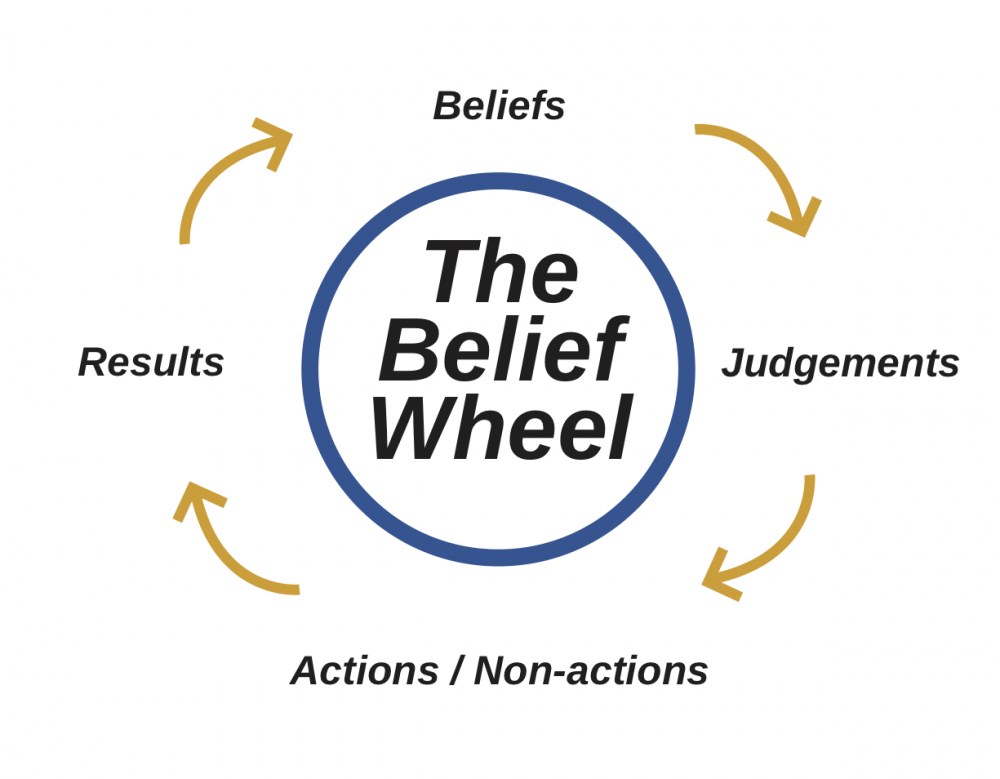The Belief Wheel

Back in the 1960s, Dr. Eric Berne developed the concept of transactional analysis and published the popular book, “Games People Play.” Whether you realize it or not, transactional analysis affects your communication and even your success with something we at Sandler Training refer to as The Belief Wheel.
Berne’s theory was that for the first few years of your life, there’s essentially a tape that’s recording everything that happens to you. Then for the rest of your life, you’re playing back portions of that tape as you make decisions in different situations.
Here’s a great example of how this can affect your thoughts and action in the sales or marketing world. Most people we work with were given many instructions by their parents, including these two commands or directives:
- Don’t talk to strangers.
- Don’t talk about money.
Then they grow up, become sales or marketing people, and they’re supposed to talk to strangers about money!
Which voice do you think is more powerful? Their manager telling them to talk to strangers about money, or the tape of their parents telling them not to?
The tape, of course! It’s pretty embedded in their subconscious mind at this point, so it’s typically the first thing they’ll listen to.
That brings us to The Belief Wheel. The Belief Wheel is all about self-fulfilling prophecies, or the idea that what you believe tends to be what happens.
It goes like this: Our beliefs lead to judgments, which lead to action or non-action, which lead to results that reinforce the original beliefs.
The Belief Wheel can start with all sorts of different beliefs. One example could be, “I’m super uncomfortable talking on the phone.”
From that belief, we make a judgment, such as, “If I make this phone call, it’s going to be super uncomfortable, so I don’t want to make it.”
That judgement leads us to either do something or not do something. In other words, take action or non-action. Maybe you don’t make the phone call at all. Or maybe you make the call, but it’s incredibly awkward.
Based on that action or non-action, we get some sort of results. If you did make the call and it was awkward, the conversation probably didn’t go how you wanted it to. And those results reinforce the original belief: Since it went so poorly, you now know you’re super uncomfortable talking on the phone.
Most of us spend more time listening to the tapes in our mind that are negative, so we tend to start out with those more negative beliefs. But there is hope to overcome those negative tapes and change The Belief Wheel to have positive results so it reinforces positive beliefs.
Positive affirmations can often help you overcome those negative tapes, and journaling your affirmations on a regular basis helps you replace your beliefs. You can also replace existing behaviors with new behaviors before you really subconsciously believe they’ll work. When you combine those new behaviors with your new affirmations, you can begin to overcome your negative tapes.
What a difference that can make! By being intentional and proactive about The Belief Wheel, it will make a difference in your organization, in your family, and really with everyone you meet.
David Curran serves as a Trainer, Speaker, Consultant, and Director of Business Development for Sandler Training in Oklahoma City, OK. He helps Business Owners and Executives work on the behaviors, attitudes, techniques, and guts they need to be more successful in business improvement, sales growth, and employee development. Before working at Sandler, David has served as the Vice President of Enrollment and Student Services for a multinational company working with universities to increase student enrollment and retention. He has led triple-digit expansion at multiple universities through enhanced communication, improved closing rates, shortened sales cycles, and systemized growth strategies garnered from the Sandler Selling System. David has also served as a business consultant for universities, think tanks, and start-ups, owned his own business tech and furniture firm, and for over 10 years led an iconic Southern California retail organization with annual revenue in excess of $45M.